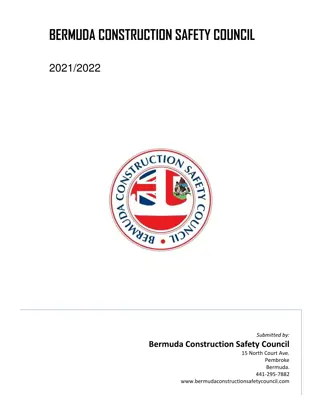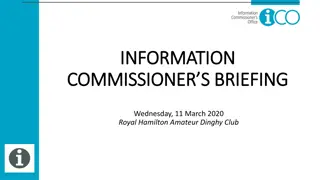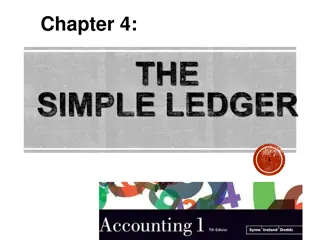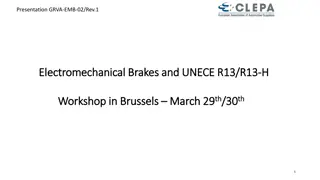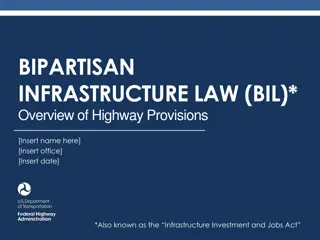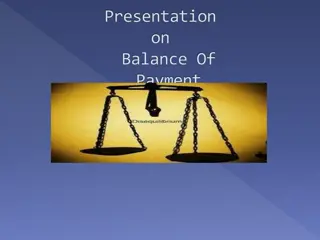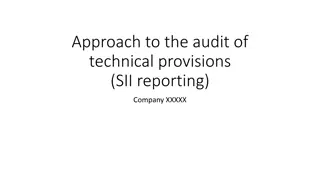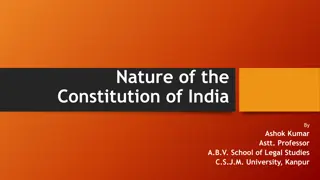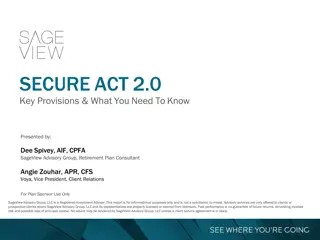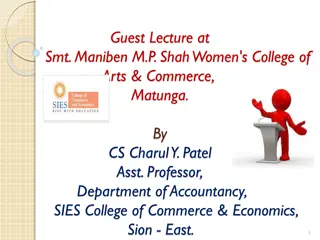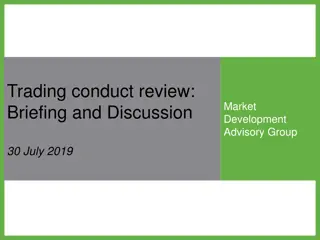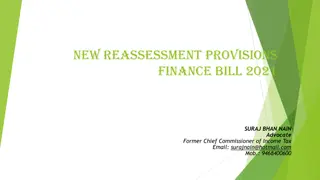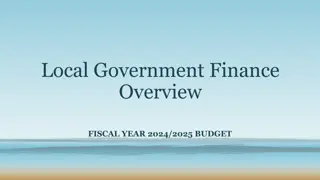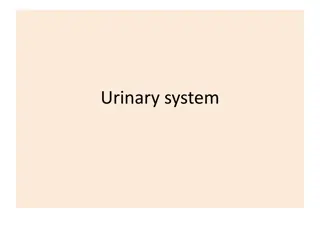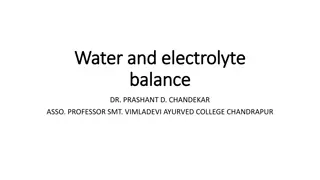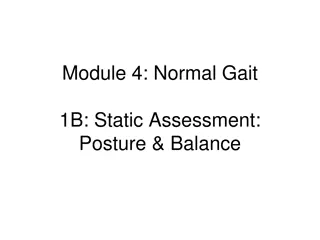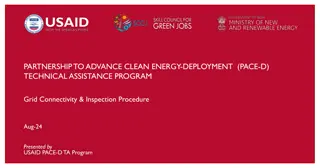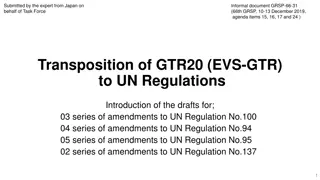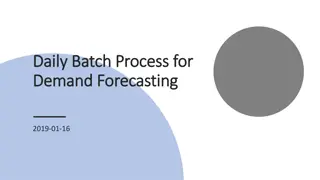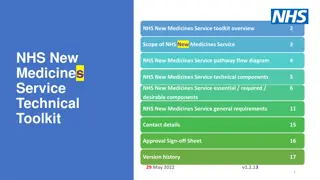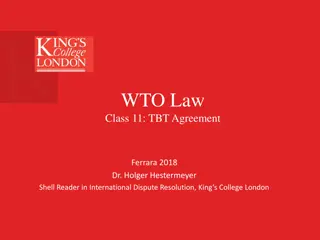Bermuda Economic Balance Sheet (EBS) Technical Provisions Overview
Detailed presentation on Bermuda Economic Balance Sheet Technical Provisions as presented at CAMAR Fall 2017. The contents cover the purpose, outline, evolution, components of Bermuda technical provisions, new requirements, actuarial methodology, and conclusion. It provides insights into the regulations, requirements, and considerations for Bermuda insurers.
Download Presentation

Please find below an Image/Link to download the presentation.
The content on the website is provided AS IS for your information and personal use only. It may not be sold, licensed, or shared on other websites without obtaining consent from the author. Download presentation by click this link. If you encounter any issues during the download, it is possible that the publisher has removed the file from their server.
E N D
Presentation Transcript
Bermuda Economic Balance Sheet (EBS) Technical Provisions Presented at CAMAR Fall 2017 Presented By: Chandrakant ( Chandu ) C. Patel, FCAS, MAAA Consulting Actuary, Huggins Actuarial Services, Inc.
TABLE OF CONTENTS Section 1 Purpose of the Presentation Section 2 Outline and Evolution Section 3 Components of Bermuda Technical Provisions Actuarial Opinion Section 4 New Requirements and Actuarial Methodology Section 5 Conclusion and Summary 2
Purpose of the Presentation Introduction to New Bermuda Regulations and Requirements Comparison of Opinion Requirements for Bermuda and the US Actuarial Methodology Considerations for New Bermuda Requirements The topic spans several areas of actuarial practice the presentation covers a limited amount of the relevant material. 4
Evolution of Bermuda EBS Impetus for new regulations was to obtain equivalence to Solvency II Initial discussion paper issued by the Bermuda Monetary Authority (BMA) in 2014 Formal methodology and requirements were issued in 2015 Trial runs were recommended for year end 2015 Formal implementation dates vary by Class. For most larger insurers and groups, effective date of the regulation was January 1, 2016 First formal opinions were required with data evaluated as of December 31, 2016 6
Bermuda EBS Technical Provisions Balance sheet components stated on a GAAP basis with prudential adjustments (for example, value of Goodwill is zero) Loss and Loss Adjustment Expense Reserves on GAAP, best estimate basis: Includes all possible outcomes (captured via Events Not In Dataset ENID provision) Categorized by Bermuda class of business (for example International and US Casualty, Property, etc.) In USD by source of (major) currency, discounted Including an explicit risk margin Premium provisions - loss and loss adjustment provisions for Unearned Premium Reserve (UPR) and Bound But Not Incepted (BBNI), including an explicit risk margin 7
Section 3 Components of Bermuda Technical Provisions Actuarial Opinion (AO) 8
Requirements for Bermuda TP Actuarial Opinion Appointed Actuary s Name, Affiliation, and Date of Appointment Discussion on Reasonability of Net Technical Provisions, including: Loss and loss adjustment expense reserves best estimate, discounted and including an explicit risk margin Premium provisions, including UPR and BBNI Include a comparison of booked gross and net claims and premium provisions to actuarial estimates Discuss actuarial methodology Discuss risk factors (on a global basis, if the entity has both US and European exposures) Disclose Risk of Material Adverse Deviation Actuarial Opinion is an extensive document with Company specific qualitative and quantitative information it is a confidential document 9
Requirements for Bermuda TP Actuarial Opinion Comments on ENID provision Comments on Reinsurance Collectibility, Asbestos/Environmental Claims Comments on Reliance on Other Actuaries Opinion should be supported by Actuarial Report; however, discussion within the Opinion should be extensive No separate Actuarial Opinion Summary required 10
Requirements for Bermuda TP Actuarial Opinion Approval An application for appointment must be made and actuary must be approved by the BMA Qualifications Professional qualifications (Canadian, UK, US, Australian & European accepted) Experience Confirm in writing relevant experience to determine and evaluate Technical Provisions Confirm compliance with Educational and Experience requirements Confirm independence 11
Section 4 New Requirements and Actuarial Methodology 12
Comparison of Bermuda TP and US Statutory Loss & LAE Opinions Bermuda TP Actuarial US Stat SLRO Opinion (AO) Nominal L&LAE Reserves Discounted L&LAE Reserves Best Estimate (including ENIDs provision) Explicit Risk Margin RMAD for Technical Provisions Explicit Premium Provisions for UPR/BBNI Central Estimate Limited Statutory Discount No Explicit Risk Margin RMAD for L&LAE Reserves Long Duration Contracts Reasonability of UPR 13
Bermuda TP AO - Reserving Issues To Be Considered Best Estimate defined as probability weighted average payout of all possible outcomes Payout Patterns ENIDS provision L&LAE Ratios for UPR and BBNI Materiality Standard that captures variability of all components of the technical provisions Assessment of Potential for Material Adverse Deviation 14
Bermuda TP AO - Loss & LAE Reserves Best Estimate should be probability weighted average payout of all possible outcomes discounted at a risk free rate (may or may not be the result of the use of a probability distribution or a statistical analysis) In actuary s professional judgment, should be neither optimistic nor pessimistic (there should be no overlap with explicit risk margin) Previous Bermuda statutory requirements were for reserves (net only) to be adequate ; based on new requirements, technical provisions should be reasonable on a gross and net basis No discussion of RMAD per previous requirements; RMAD needs to be discussed and disclosed If traditional methodologies cannot contemplate all possible outcomes, the actuary is expected to give due regard to events that may not be included in the data set via the use of Binary Events or ENIDs ( Events Not In Data Set ) 15
Potential Methodology for ENIDs Judgmental assessment of tail risk; Company may conclude that dataset reflects all possible events ENID load applies to loss & LAE reserves as well premium provisions Use explicit probability distributions and estimate using tail components (for example, loading required to move from 97th percentile to 99th percentile) Assume probability distribution is based on truncated data and gross up for potential missing events ; for example, use limited and unlimited Pareto distributions Examine industry data to assess the impact of outliers and determine a factor based on these statistics 16
Potential Method for ENID If 99th %tile = 8.0 and 97th %tile = 7.5, ENID load could be 8.0/7.5 = 1.067 or 6.7% 17
Premium Components Unearned Premium Reserves new requirements move away from premium deficiency test to actuarial assessment of expected future claims and expenses Method 1 UPR Minus DAC; no provision for BBNI Method 2 Reflects estimated UW Profit/(Loss) in UPR/BBNI Actuary needs to assess the amount of and the related premium provisions for Bound But Not Incepted ( BBNI ) or legally obligated business; significant challenge for reinsurance companies that bind reinsurance renewal contracts several years into the future 18
Risk Margins Evaluated using Cost of Capital method i.e. the cost of capital required to account for insurance, credit and operational risks; BMA supplies the rate to be used for cost of capital Assessment of the risk margin covers full period of runoff of insurance liabilities Cost of capital is then discounted using risk free rate For year end 2016, risk margins were computed using templates provided by the BMA; the actuary was expected to review the reasonability of the underlying methodology and to confirm that the calculations were performed per the Rules 19
Potential Adverse Deviation Actuary could determine a materiality standard based on the total amount of Technical Provisions or Economic Capital Loss & LAE Reserves Discount included in the TPs ENIDs provision Loss & LAE estimated for UPR & BBNI (including ENIDs provision). If there are no risks that could lead to material adverse deviation, this must be disclosed proactively Risk factors should be identified; for Companies with global portfolios, these should cover risks on a global basis (requires detailed knowledge of potential non-US risks) 20
Bermuda Technical Provisions Actuarial Opinion Effective January 1, 2016 for most insurance companies Many more components than US statutory opinions Requires an understanding of premium components, cost of capital and risk margins Requires actuary to reference more Actuarial Standards of Practice than would apply to US statutory opinions Requires knowledge of global insurance market place US actuaries competing with actuaries on a global basis 22
Reference Material Bermuda Monetary Authority (BMA) CONSULTATION PAPER ECONOMIC BALANCE SHEET FRAMEWORK DECEMBER 2014 CONSULTATION PAPER - GUIDANCE NOTE - ACTUARY S OPINION ECONOMIC BALANCE SHEET TECHNICAL PROVISIONS - DECEMBER 2015 GUIDANCE NOTE GROUP ACTUARY S OPINION - MAY 2016 Yuriy Krvavych: Binary Events Loading for Solvency II Technical Provisions: Practical Approximations 23



